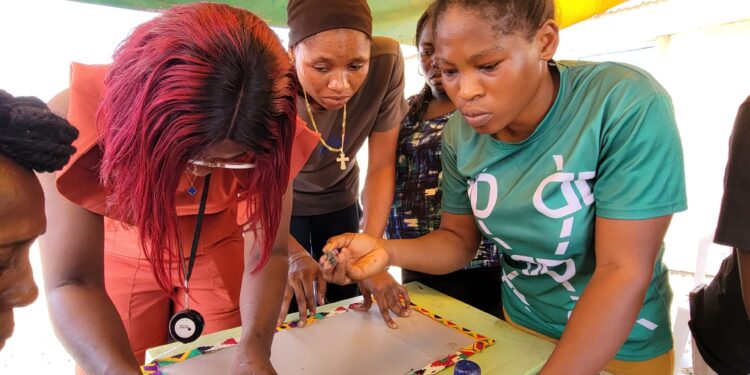By Prosper Okoye
The Aisha Achimugu Foundation (AAF), in collaboration with TASTH and Rachel Owan Enoh Foundations, has trained over 50 young women in various vocational skills on Saturday in Abuja and provided them with the necessary tools to start their businesses.
AAF Programme Director, Kiema Ogunlana said the outreach marks a shift in programming approach, aiming for sustainability. “The beneficiaries are still vulnerable women; however, we are not just giving them palliatives. We are empowering them to be self-reliant, so they can, in turn, fend for themselves and their families,” she explained.
Dr. Ogunlana stated that the initiative would have an impact despite the growing quest among young Nigerians for quick and easy money, which she attributed to the decline of family value systems. “Gone are the days when we put our hands to the plough. Now, we see people turning to nefarious activities in pursuit of quick money, a trend I attribute to the decline of family value systems. Yet, there is still dignity in labour—people don’t need to be swayed by social media trends. Everyone has a skill or talent.
“We didn’t assign skills to the women beneficiaries. Instead, we offered them a range of options and encouraged them to choose one they’re passionate about. With commitment and diligence in their training, they could earn two or three times more than the value of their starter kits, setting them on a path to growth.”
Furthermore, the Programme Director decried the shortfall of corporate organisations in implementing corporate social responsibility. “Most of the time, they claim to be giving back, but the impact is not visible. While some organisations have their own foundations, there is a need to collaborate with other NGOs within the communities they operate in to create meaningful change. This way, as they profit, the lives of the people can improve,” she added, calling on the government and other CSOs to accelerate actions and partnerships to reach more vulnerable Nigerians.
The outreach was part of the activities commemorating International Women’s Day 2025.
Speaking at the event, Rosemary Ebuta, Founder of the TASH Foundation, emphasized the ripple effect of the empowerment program. “We told the women earlier that they should learn as much as possible—not only to earn from it but also to become trainers and empower other women in their communities within the next three months.”
She added that similar empowerment schemes would be held in all 36 states of the country, echoing the need for support from the government and other funders. “A man may have a noble initiative, but it takes the help of the entire community to bring it to fruition,” she concluded.
The women benefited from skill sets including training in Ankara bag and shoe making, lip gloss production, makeup artistry, and soap and Vaseline production.
The Chairperson of the Rachael Owan Enoh Foundation, Rachael Enoh, noted that the empowerment program empowerment program comes at a critical time, given the widespread hardship affecting the country. “Times are so tough that survival without work is nearly impossible. Even married women can no longer rely solely on their husbands without risking being perceived as burdens.” She encouraged beneficiaries to seize this initiative as a vital opportunity to learn and enhance their lives, assuring them that follow-ups would be conducted to monitor their progress and provide further support as needed.
Among the beneficiaries was National Youth Service Corps member Areu Hannah, who is training in makeup artistry. She shared, “The training is going well. I’m passionate about becoming a makeup artist. I’ve been practicing at home, but I’ve struggled with blending properly, so I joined this programme to improve my skills. I hope to refine my techniques and eventually earn millions of Naira from this business.”
Mojisola Johnson, who is learning Ankara fabric and bag making, expressed her excitement about being selected. “I’m grateful to the organisers,” she said. “I chose to focus on Ankara bags because it has always been a passion of mine. I love that it represents an African brand and celebrates our culture.”
Funke Adebe, who is training in soap making, added, “After this training, I believe God will help me start my own business. Soap is something people always need.”
























